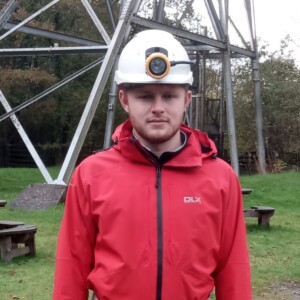
Nathan Westwood
Loughborough University
Project
Next Generation LA-ICP-MS in Geoscience
Supervisors
- Dr. Amy Managh (Loughborough University)
- Dr. Matthew Horstwood (BGS)
- Dr. David Douglas (ESL)
- Dr. Jim Reynolds (Loughborough University)
PhD Summary
Recent developments in high efficiency transport systems have transformed the capabilities of laser ablation – inductively coupled plasma – mass spectrometry (LA-ICP-MS). Analyses can now be performed at around 50x higher speed than the previous generation technology, with high spatial resolutions down to the 1 µm level. The technology has also helped to double mass spectrometer efficiencies, optimising measurement precisions and therefore resolution of compositional change. Developments to the core technology were originally driven by demands for higher throughput imaging in the biosciences, thus are not yet in routine use for geoscientific applications. However, once fully characterised, the technology has the potential to be the gold standard for laser ablation ICP-MS in the earth sciences, enabling accurate measurement of lower elemental and isotopic concentrations, higher resolution interpretations of compositional change and representing a step change in capabilities for geoscientific applications.
Previous activity
Prior to starting my PhD, I originally studied geology for my undergraduate degree at the University of Brighton. Following the completion of my BSc, I worked at Bexhill College as a teaching assistant for a year before moving on to study for an MSc in Earth Sciences by Research degree at Royal Holloway, University of London. The focus of my research during my MRes was on energy-critical element (ECE) occurrences in the English Lake District; chiefly the cobalt bearing mineral deposits at Scar Crags and Dale Head North with a particular emphasis on their geological setting, mineralogy and geochemistry.
Why did you choose doctoral research?
My passion for research really started during my time as an undergraduate. The modules I felt most engaged in and excelled at were those which contained some degree, or were comprised entirely of independent research. Throughout my year away from further education working as a teaching assistant, this passion was really highlighted as I found myself particularly missing the pursuit of new knowledge on a topic I found fascinating. This drove me to swiftly move on and undertake an MSc by Research (MRes) which I enjoyed many aspects of. My positive experiences as an MRes student, along with the skills I was able to gain throughout the program, I believe acted as the perfect platform to progress onto the more extensive PhD qualification.
Why did you choose CENTA?
Places for CENTA studentships are highly competitive for a number of reasons aside from the financial. Not only are they recognised on the national scale, but on the international one too. This is due to the excellent training they provide for early-career researchers which is hosted at one or more of their highly respected and well established research intensive universities or institutes. Being part of the CENTA consortium enables students to interact with other researchers outside of their own institution more easily which is beneficial on many levels. Also, students are presented with a diverse range of comprehensive workshops and training courses, as well as extensive support on a professional and personal level, enabling them to achieve the most out of their research programs and develop into well rounded professionals. It is for these reasons that I was particularly interested in the studentships on offer through them.
Future plans
Working with CENTA gifts me the opportunity to develop into a well rounded professional, whether that be for a future in academia or industry. Personally, I would like to continue to pursue a career in research within the fields of geology and analytical chemistry; particularly focusing on the development of analytical instrumentation for analysis in the mineral exploration and extraction industry – hopefully aiding our drive for a greener future. I also have a particular passion for science outreach due to my awareness of the precarious position the geosciences are in below the university level. Thus, I would like to be able to integrate this into my future career plans, and I believe the being part of the Loughborough community, BGS and CENTA consortium as a whole will provide me with the skills to do so.
